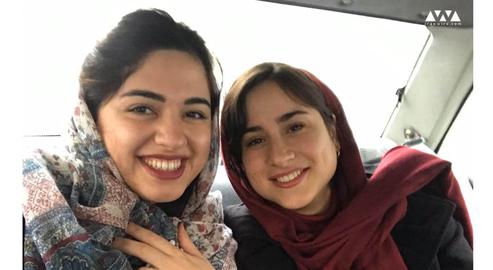This report is a summary of IranWire live chat on Monday, 4 February 2020, which, like every Monday, is broadcast live at 10pm Tehran time on Iranian social media.
Paniz Ganji, sister of Puneh Ganji, one of the victims of the crash of Ukrainian Airlines Flight 752, who was in Tehran at the time of the incident but who lives in Holland, talks about life for her family after the catastrophe. Ali Gorji, Panic and Puneh's uncle, talks about his efforts for justice in Canada and his complaint against the Islamic Republic.
"People from the Bonyad-e Shahid [the Martyrs Foundation] asked to come to our house to give their condolences. We said do not want or need their condolences. But they did not leave us alone; they continued to call and text us and came and knocked at our door several times. Even on the day of the funeral, Mr. Shamkhani, the Secretary of the Supreme National Security Council, came in person, but the family told him that he was not invited and asked why he came, to which he had said he had only come to give his condolences. They told him they did not need his condolences and that he was not allowed to stay."
Paniz Ganji, whose sister Puneh was killed when Iran’s Revolutionary Guards accidentally shot down Ukrainian Airlines Flight 752 on January 8, said that many families of those lost in the accident had felt pressure from officials to accept that their loved ones are “martyrs” as a result of the crash.
Suggesting that the victims had suffered “martyrdom” in service to their country is one way that Iran’s government has tried to deflect blame for the tragedy.
Paniz said that her sister Puneh had emigrated to Canada to study at the University of Alberta in 2017 and had returned to Iran in January for a visit and to get married. Her husband, Arash Pourzarabi, was also on Flight 752. The wedding was just a week before the disaster.
Iranian officials spent the first three days after the crash denying any involvement – and did not even contact the families of those killed.
“We went to some kind of clinic or hospital in Kahrizak on Wednesday afternoon for DNA samplings,” Paniz told IranWire. “They took samples from my father and mother. We completed a form declaring what [items] Puneh had with her. I don’t know if it was actually a hospital, but it looked like a military facility, and there were many military personnel there as well as families [of those killed in the accident].”
Paniz says that, in there days after the crash, family, friends and acquaintances all came to their home to express sympathy. And even before the Revolutionary Guards accepted responsibility for the crash, some visitors speculated that the authorities were involved.
"My father said the government had committed to disclosing the contents of the flight recorder, which would have meant that they weren’t responsible for the accident. We begged our guests to not speculate in the meantime, so that we wouldn’t feel even more pain, because that would be too painful to imagine,” Paniz said.
Paniz told IranWire that another troubling matter for their families – in the days before the authorities accepted responsibility – was their doubt over than Ukrainian Airlines.
“We naturally thought a technical issue, due to the outdated aircraft or poor-quality maintenance, resulting from the low-price of the airfare, was the cause of crash,” Paniz said. “Our guilty consciences did not leave us. We kept asking why we didn’t get our family on a better airline. The thought was very bitter and we blamed ourselves for something that simply was not real.”
According to Paniz, on the Saturday morning after the crash, her mother was shocked to hear that Flight 752 had been shot down by a missile attack. The mother went to the roof of her home and screamed for half an hour to control her pain and anger.
Everything changed after the Saturday – when the authorities accepted responsibility for the crash. Officials then started coming and going to the Gorji home, as well as the homes of other families who lost loved ones in the crash, to express condolences and to press the families to accept that their relatives had died as “martyrs.”
"We went away for a few days because we didn't want to see them,” Paniz said. “They would come to our house and say that they were only offering their condolences. They called my father from the Martyrs Foundation using different numbers. We removed the door buzzer and shut the door, but it did not work, and we had to go to a relative's house. Our neighbors were also bothered because the officials ask them for our phone numbers. This went on for several days."
Paniz said that even the date of the funeral was changed at the last minute to avoid being harassed by officials. But Ali Shamkhani, from the Supreme National Security Council, nevertheless managed to appear just as the remains were being buried. The Gorji family told him he was not invited and asked why he had come, to which he replied he had come only to give his condolences. The family said that did not need his condolences and that he was not welcome to stay.
“For my part,” Paniz added, “I regard them as the people who killed Puneh. How can I accept them?"
Paniz also noted that, one day when leaving the house, she was confronted by an agent from the Martyrs Foundation. The agent said that his father had been a martyr when his mother was still young, offering his condolences, and suggested that Paniz’s mother register at the foundation to receive a stipend for her deceased daughter Puneh.
The Gorji family had kept its mourning quiet and private – insisting on a low-key funeral and avoiding talking to the media. But when the issue of a formal complaint by the Canadians emerged, things changed; in addition to agents of the Martyrs Foundation, the Gorjis also received visits from police officers, who asked whether Paniz was planning to return to Holland where she is resident.
“I have no idea what the local police station had to do with this,” Paniz told IranWire, but “when I realized there may be more serious inconveniences for us, I changed my plans and returned to Holland sooner than expected.”
Paniz also said that phone calls from officials to her father changed from then on.
“Beforehand, the calls were gentle,” Paniz said, “but after that they became aggressive and they pressured my father on why he didn’t answer their earlier calls. My father had to turn off his cell phone. Of course, we still don't know what they want. We have said that we ... do not consider Puneh a martyr. But they do not let us go."
Official insistence on calling Puneh and Arash’s death “martyrdoms” reached such a point that, according to Paniz, one week after the funeral, the Martyrs Foundation laid a gravestone on the grave the couple share, without telling their families, and that the new gravestone calls both Puneh and Arash martyrs.
“We know that they are not martyrs and that they have been killed; they [the authorities] have killed them themselves,” Paniz said.
But Paniz also complained about other people's reactions to the situation.
“For Puneh and Arash, privacy was very important, but Puneh and Arash's private wedding videos and photos were unfortunately posted on social media [after the disaster]. We were shocked,” Paniz said. A prominent family-oriented magazine in Iran even used the image on its front page. “When we protested, they said you should be glad because now you have become famous.”
Paniz added that she has no hopes of bringing a lawsuit in Iran because she believes any information that was released was because of the pressure being applied to Iran by foreign governments. “If this flight were a domestic flight, they would be silent,” Paniz said. “But I do not expect that the Islamic Republic will be held accountable for this case, either; I think they are buying time to bury this problem like any other crisis.”
Paniz said that, because, the Islamic Republic covered up the truth for three days, "How can we believe that the only system they invest in, the military system, to be so inefficient? How can we believe this was human error? No one in the government has ever answered any questions and they are still not delivering the flight recorder either."
Paniz even worried that the government may still be hiding something – and she hoped that the flight recorder will not ultimately suggest the flight was intentionally shot down. “We are unlikely to be able to tolerate that,” she said, “we are fighting for survival even now.”
Ali Gorji, the late Puneh’s uncle, who lives in Canada, said that the family’s experience in Canada contrasted sharply with what happened in Iran.
"Three days after the incident, [Prime Minister] Justin Trudeau met with the relatives of the deceased, showed considerable sympathy, and showed an attitude towards the survivors which we did not see at all in Iran,” Ali said. “In Iran, the government first lied, then declared that something had gone wrong, now they are not delivering the black box, and there are indications that they have done this on purpose and that the aircraft and the passengers were actually used as human shields. This is a crime in itself, and we go beyond that, we believe the shooting was deliberate, based on the evidence.”
Ali Gorji says some Ukrainian families have joined with some of the Iranian families and that they are working together to assist the formal complaint by Canada’s government.
“A part of our claim is that the shooting was deliberate,” Ali said, “and we are looking for proof. It will be an international effort and we have a lot of evidence and we are in touch with many experts."
Ali added that as part of the complaint effort, they hope that any lawsuit brought by lawsuit by the Canadian government, whose interests and security are at stake, will be taken to the International Criminal Court.
"The basis of our complaint is that the downing of the Tehran-Kiev passenger plane was not the result of human error. We know the rulings of that court may not be enforceable, but the issuance of a warrant is very symbolic for the perpetrators of this crime,” Ali said.
Ali finished by saying that the disaster of the missile attack on a passenger plane is a warning to the Iranian people; that if they do not stand up against this government, this will be the fate of all Iranians.
“We are dealing with a regime that is spiteful and cowardly, despite its claims,” Ali said. “When they see a more powerful force pursuing the truth, they can't do anything. We are not afraid of anything. This tragedy has left people in deep shock and grief. I will stand by my life for the blood of Puneh and Arash.”
visit the accountability section
In this section of Iran Wire, you can contact the officials and launch your campaign for various problems




























comments